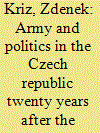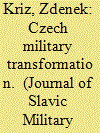| Srl | Item |
| 1 |
ID:
098363


|
|
|
|
|
| Publication |
2010.
|
| Summary/Abstract |
This article focuses on relations between army and politics in the Czech Republic after the 1989 Velvet Revolution. This article concludes that these relations in the Czech Republic achieved the parameters typical of consolidated democracies. The many problems that continue to exist in this area in the Czech Republic do not in any significant way deviate from what is typical of consolidated democracies. Therefore, the transformation of civil -military relations can be regarded as successful.
|
|
|
|
|
|
|
|
|
|
|
|
|
|
|
|
| 2 |
ID:
101056


|
|
|
|
|
| Publication |
2010.
|
| Summary/Abstract |
The new security challenges began to be emphasized in Czech strategic documents as early as the beginning of the 1990s. As a result, the Czech Army has been undergoing its radial and essentially continuous transformation since the beginning of its existence in 1993. The elimination of these threats became an important task for the Czech military. In contrast with the situation in the other armies of consolidated democracies, the ideal of the military professional has not changed much in the Czech Republic. It still is a combination of a warrior, technician, and manager. In 1989-92, there were some processes taking place in Czechoslovakia in the area of civil-military relations that, in many respects, differed from the development in Western Europe. The most important of these was the process of the de-politicization of the army in the sense of freeing it from Communist Party influence and control.
|
|
|
|
|
|
|
|
|
|
|
|
|
|
|
|
| 3 |
ID:
108573


|
|
|
|
|
| Publication |
2011.
|
| Summary/Abstract |
This article traces the evolution of European Union-China relations in terms of
arms transfer, specifically from France, Germany, and the United Kingdom.
States sell arms for the reasons of security, political influence, and the pursuit of
wealth; however, the motives for the arms trade conducted between these European
countries and China are driven by political decisions that will increase European
non-military exports to China to improve general trade conditions for European
investors in China. The EU-China arms trade should be perceived as a gesture of
goodwill, because even though China has a massive army and implements extensive
military modernization, EU countries have decided against a large-scale arms
trade with China. The EU arms trade with China remains limited due to political
decisions based on the responsibility to their allies within the European Union
and in terms of NATO with the United States.
|
|
|
|
|
|
|
|
|
|
|
|
|
|
|
|
| 4 |
ID:
177764


|
|
|
|
|
| Summary/Abstract |
All Czech strategic security documents since the end of the Cold War have been based on the argument that the risk of any direct military aggression against the territory of the Czech Republic is virtually nil. The 2015 Security Strategy responded to the changes of international security environment, especially to the Russian aggressive policy in Ukraine, hybrid war waged by Russia against the West, escalation of conflict in Syria against the background of the Arab Spring and the refugee crisis directly related to it. The 2015 Strategy continuously develops the ties to the transatlantic security partnership (NATO) and building up the security dimension of the European integration process. However, it is very likely that the Czech Republic can be expected to become a passive actor, meeting its allies' expectations only to an extent that is strictly necessary.
|
|
|
|
|
|
|
|
|
|
|
|
|
|
|
|